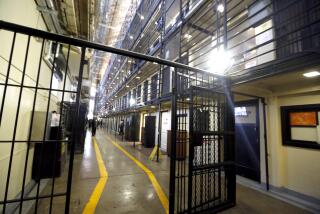Proposition 34’s common-sense appeal
Proposition 34, the measure to replace the death penalty in California with a sentence of life without the possibility of parole, appears to be struggling. Last month, a USC Dornsife/Los Angeles Times poll found the initiative trailing 38% to 51%, although other surveys, such as a Field Poll released in September, showed a closer margin of 42% in favor and 45% against.
But there may be enough undecided voters in California to sway the outcome in either direction. If they can replace visceral notions of revenge with a thoughtful examination of the morality, cost and effectiveness of capital punishment, they will put this long-delayed and badly needed policy change in place.
With both sides recently releasing their campaign salvos, the “no” side is going for the emotional jugular — so much so that it often seems to abandon logic altogether. The Vote No on 34 website features profiles of some of the most heinous killers on death row, neglecting to mention that even if Proposition 34 fails, they’re far more likely to die of old age than lethal injection. Nor does the “no” side acknowledge that a sentence of life without parole wouldn’t make existence any easier for convicted felons, and in some ways would make it harder because they would be more likely to be assigned to work detail.
ENDORSEMENTS: The Times’ recommendations for Nov. 6
Some of the opponents’ arguments are outright nonsensical, such as the claims that life without parole is no guarantee that an inmate won’t be released, because governors still have the power to pardon them. True enough, but that applies equally to inmates on death row. Proposition 34 doesn’t make an inmate any more likely to be pardoned.
The Yes on 34 campaign’s ads, released this week, appeal more directly to voters’ common sense. A TV commercial tells the story of Francisco “Franky” Carrillo, sentenced as a juvenile to two life terms in prison for a murder he didn’t commit and exonerated after 20 years behind bars. Stories like his are the main reason The Times has endorsed Proposition 34: Courts are not 100% reliable, and although there’s little doubt that most death row inmates are reprehensible people who may deserve their fate, there is no knowing whether all 725 of them are guilty. That’s why the appeals process is so long, burdensome and expensive, and it’s why voters should end the risk that California will execute an innocent person.
One well-respected study found that the death penalty costs California taxpayers $184 million a year in court and security expenses. That’s a high price to pay for a sentence that hasn’t been carried out since 2006. Seventeen states and the District of Columbia have abolished the death penalty. California should join them, and will if voters of conscience and common sense turn out and do what’s right.
More to Read
A cure for the common opinion
Get thought-provoking perspectives with our weekly newsletter.
You may occasionally receive promotional content from the Los Angeles Times.






